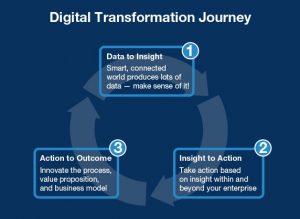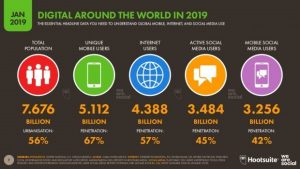“Digital transformation” is a term that is often thrown around in business circles. To some, it is just a buzzword that will soon die down. However, those who pay attention to it would know that it can have a great impact on their companies.
Digital transformation means shifting a company’s processes to the digital world and to do away with manual parts of workflows. The entire journey involves three steps, according to SAP Insider:
- Transforming data to insight
- Using insight in making intelligent actions
- Converting actions to outcomes

Digital transformation has three key steps.
This does not occur only once though–this is a repetitive cycle that helps you optimize your digital ecosystem further.
And throughout your continuous journey, you will uncover various benefits of digital transformation. Below are seven such benefits that can revolutionize your business.
- Enhanced customer strategy
When you create an organization with connected workflows and accessible information, you can discover new ways to find, acquire, and retain customers. This benefit can lead to greater earnings for your company because keeping current patrons is more cost-effective than finding new clients.
With digital transformation, you can also use the current technology investments you have to enhance the customer experience you offer. Since you are able to see better what your customers want and need, you can direct your support and sales staff in meeting them. The important thing is to be consistent–because every important party in the pipeline has access to a single source of truth, it is possible for steady customer experience in all touchpoints and channels you have.
- Improved market reach
Did you know that the forecast for mobile transactions this 2019 is expected to surpass 1 trillion US dollars? This is according to Statista, a research body that also said that mobile e-commerce spending has been increasing steadily since 2010. This is happening because items have become reachable to consumers via online markets like eBay and Amazon. Mobile applications that offer in-app purchases have also contributed to this rise greatly.
This is a trend that your enterprise can capitalize on. By including expansion to mobile in your digital transformation framework, you put your products and services at the fingertips of customers 24/7. They can learn about what you can do for them from reading on your website and online brochures and decide to sign up afterward. Even if you cannot process orders immediately, having a mobile and always online shop helps you increase the volume of your transactions.
- Comprehensive analytics
Going digital affords you the ability to track metrics and look into the data you gather over a period, especially when you have a marketing strategy in effect. This is possible because digitized processes create stronger connections between systems, applications, and databases.
Since you have streamlined access to data, you can better analyze historical data and generate forecasts. Therefore, you can gain insights that come from a wide variety of enterprise sources and produce reports with data visualization out of them without a sweat. Thus, you can identify areas that are not keeping up with your objectives and determine the right tactics to resolve them.
Moreover, comprehensive analytics assist you in preventing problems that may arise due to oversight.
- In-the-moment actions
Historical data is not the only type of data that is within your reach when you implement digital business solutions. With the interconnectedness of enterprise platforms, you can also gain real-time insights. These allow you to analyze up-to-the-minute data that enable your organization’s decision-makers to choose the right course of action at the moment. This way, they can seize the opportunity to make decisions that would have an immense and positive impact on the operations, rapport with business partners, and customer relationships.
Of course, data-driven decisions would result in higher ROI than decisions based on guesswork.
- Boosted brand reputation
In January 2019, there were around 3.484 billion active social media users. Contrast that with the fact that there are 7.676 billion people in the world. This means that social media’s penetration of the global population is now at 45%. And out of that, there are 3.256 billion mobile social media users, putting the penetration of mobile apps to 42%, according to Hootsuite.
But it is not just ordinary individuals sharing their lives and thoughts on social media. The Hootsuite Social Barometer of 2018 also showed that 90% of the brands who responded to the survey have social media accounts. They said that they use these platforms to spread awareness about their products and services.

The world’s total population is 7.676 billion and out of that, 45% or 3.484 billion are active on social media.
But social media has uses beyond attracting customers: it can also enhance a brand’s reputation. When the business shares content, it is aligned with their branding. By continuing to release posts that are consistent with the branding, customers can recognize what the brand is all about. However, if you are overwhelmed by this task, you can always rely on tools and partners who use social media management for MSPs.
- Adaptation to a competitive industry
In the course of implementing your digital transformation strategy, your organization becomes more customer-centric. As you learn more about the requirements of your audience, you can also discover different possible products and services that you can extend to them. With this, you can create new streams of income for your enterprise. This ensures that you have multiple options where you can get the finances for your overhead as well as for your projects and social endeavors.
Through this approach, you can become more competitive in an industry that is always evolving.
- Encouraging company culture
In this increasingly digital world, telecommuting and the use of digital devices for work is on the rise. That is why a digital workplace has become fundamental in the flexibility and adaptability of an organization.
Digital has enabled colleagues and teams to collaborate with little to no friction because everyone knows what the other is talking about and doing. What’s more, it has provided companies a way to create a culture that encourages creativity and innovation. As a result, employees come up with unique ideas that can drive efficiency productivity when it comes to tasks and implement approaches that can attract more people to the company.
Additionally, going digital helps you equip your employees with the skills and knowledge they need to become effective in carrying out the responsibilities of their roles. This provides a great benefit to your organization because you can nurture people who could make a difference and take your business to greater heights of success.
Improve your overall efficiency
In the course of implementing your digital transformation framework, you may also encounter the conundrum of SaaS vs PaaS vs IaaS. It may seem like a difficult choice, but the differences between these three lies in their purpose. Once you have determined your challenge and picked out a solution, you can find the best cloud computing service for your organization.
This decision is vital to your digital transformation–the systems you choose can affect the way you implement your digital transformation strategy and to get your entire organization on board. However, once you have rolled out the necessary changes, you can begin experiencing the benefits of the digital world and see a change in your company’s overall work efficiency.